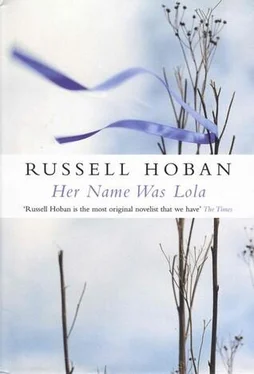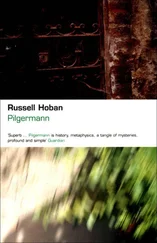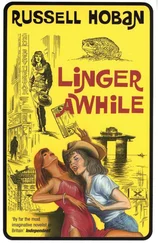They don’t stop trying. The latest hopeful is a retro type called Geoffrey who wears a gold chain with an ankh. In London he drives a Mercedes but he makes his annual Diamond Heart pilgrimage in a white Bedford camper decorated with scenes from the Kama Sutra. Geoffrey is a dentist with a moustache and a beautiful jet-black toupee. He has hairy hands. He’s always got his Nikon with him and he’s been snapping Lola on her way to and from the Ghoshes’ studio and on her evening walks. She ignores him as long as she can but one day she confronts him and says, ‘I wish you’d stop taking pictures of me. It gives me the creeps.’
‘I’m sorry,’ says Geoffrey (snap, snap), ‘but I can’t help it. Your face speaks to me.’
‘Read my face’s lips,’ says Lola. ‘They’re saying, “Go away.” She’s only a few steps from the studio but she’d like to clear away this annoyance and compose herself before going in.
‘I’d love to have a proper photo session with you,’ he says. ‘The shots I’ve got so far don’t really do you justice.’
‘I don’t need justice,’ says Lola, ‘only a little mercy. Please take yourself and your camera elsewhere.’
‘Do you believe in destiny?’ says Geoffrey.
The sarod in its hard case weighs eight and a half kilos, and with a healthy swing and a good follow-through Lola could certainly flatten this turbulent dentist. She changes to a two-handed grip on the case and something like a snarl starts far back in her throat.
One of Geoffrey’s hands has jumped on to her arm. ‘Think about it,’ he says. ‘Fate works in mysterious ways. Sometimes both people realise what’s happening, sometimes only one.’
Lola shakes off the hand which does not drop to the ground and crawl away but remains attached to Geoffrey’s arm. ‘I have a large friend who’s a black belt,’ she says. ‘If I phone him he’ll be up here like a shot to sort you out.’
Geoffrey’s hands fly up in front of him, palms out as he backs away. ‘Peace!’ he says. ‘I can see that you have a lot on your mind. We’ll talk about this another time.’ He goes off singing, ‘“I met her in a club down in old Soho, where you drink champagne and it tastes just like Coca-Cola. See-oh-el-aye cola, el-oh-el-aye Lola la-la-la-la Lola.”’
Lola, somewhat ruffled, smooths herself down and goes in for her lesson. Her concentration is perhaps a little more intense than usual. Mr Retro is not the only current aspirant. There are of course others, some of them not at all objectionable to a less critical woman. To these she says, when they suggest this or that, ‘I’m sorry, but all I can think about is this raga I’m trying to compose. I really have no time for anything else.’
Lola’s ‘Smriti’ is in a state of becoming; it’s becoming her and she’s becoming it. The becoming changes every day, and every day Lola discards the work of the previous day. Playing what she’s written, she hears a thickness of tone where it should be fine-spun. She hears a tempo false to the impulse of the melody, hears a clumsiness of ascent and descent. She hears the music not voicing what is in it that wants to speak and she shakes her head and starts again. Memory! Sometimes the widening ripples of dark waters, sometimes flecks of gold in the bed of a stream. The blue sky reflected in a lake, the grey sky over the sea. Changing lights and changing shadows always, images dim and deep or sticking up sharp and dangerous. Lola will not stop until this raga lets go of her. And the raga won’t let go of her until it has said everything it needs to say.
July 2001. Max has four Lola songs on CD: the Dietrich one from The Blue Angel; Barry Manilow’s ‘Copacabana’; the Kinks’ ‘Lola’; and ‘Whatever Lola Wants’ from Damn Yankees. Every now and then he plays one of them, but the song he listens to most is Dietrich’s. This takes him back to when Lola came to his place in February 1997 and did her Dietrich routine with the black corset, suspenders, etc. Max is haunted by that memory. Lola was impersonating an actress who impersonated a café entertainer in the Berlin of 1930. ‘Ich bin die fesche Lola, der Liebling der Saison! Ich hab’ ein Pianola zu Haus in mein Salon!’ Dietrich flings out the song with an adorable throwaway don’t-give-a-damn sluttish cheerfulness that is a footnote to Lola Bessington’s performance, a flicker of something ordinarily unseen in Lord Bessington’s daughter. This image, this flavour, joins the Lola of that winter day in St Martin’s Lane and the Dover Bookshop, the coltish Lola with cheeks like cold apples. There are so many Lolas! Flashes of her revolve in Max’s head from the glitterball of moments past. So many Lolas, so many moments. Gone.
More and more it comes to Max that he’s absorbed very little of Lola’s lolaness. ‘What’s the first thing you learned,’ says his mind, ‘when you first started writing?’
‘To explore my material,’ says Max.
‘And did you explore the many and varied lolanesses of Lola? The uplands and lowlands, mountains and plains, forests and savannahs? Did you commit to memory the latitudes and longitudes of the islands and archipelagos of Lola? Her winds and tides and barometric pressures? Her El Niños, for Christ’s sake?’
‘Some,’ says Max, ‘but not enough.’
‘What,’ says his mind, ‘you didn’t have time? You weren’t interested?’
‘Of course I was interested,’ says Max.
‘Interested how? Like when you look at a fast food menu and you say, “Gimme a cheeseburger, large fries, and a Diet Pepsi?” Real deep interest like that?’
‘Come on,’ says Max. ‘Enough already. I’m an idiot and I lost her.’
‘No,’ says his mind. ‘Not enough. You’re missing the point. Let’s talk about Lula Mae Cheeseburger with the large fries. If you’d given Lola all the attention and interest she deserved you wouldn’t have had anything left over for Texas takeaway. Schmuck! That’s what love is — when there’s nothing left over for another woman. Some explorer you are.’
‘You’ve got some mixed metaphors in there,’ says Max.
‘I do that when I get excited,’ says his mind. ‘I can’t help it.’
October 2001. Today Lola and Noah perform her raga for Indira and Hariprasad. Hariprasad has set up his equipment to record the music and will burn it on to a compact disc. ‘This raga is dedicated to you, our teachers,’ says Lola. ‘I have tried to be the vessel only for what has come to me. And whatever has come to me has come through your teaching. Thank you.’
Now when she plays, the sarod and the plectrum come to her hands like old friends. The music is already there, waiting to be heard. Noah has handled his nakkara since infancy. Now, almost four years old, he keeps the beat impeccably, proud to be making music with his mother.
‘Smriti’ begins so quietly that almost it seems unwilling to leave the silence. The first notes are like leaves falling on autumn waters. Yearning for what has been, tasting the passage of time, calling up faces from the shadows, words from the silence, reaching for departed hands. As it goes on, the raga circles and repeats and lingers over its themes. Happiness, sadness, longing and regret trace their figures with recognition and without anger. This is music that was not in Lola when she first came to Diamond Heart.
When the raga ends, Indira and Hariprasad nod their heads and there are big hugs all round. ‘Now,’ says Indira, ‘you are sumadhur-ragini. Su means good; madhur means sweet; and ragini means an expert in rendering ragas. You have given yourself to the music and we have just heard how the music has given itself to you. You are an artist now, and it is good that you are serious about your music. But don’t be serious all the time. Have a little fun now and then.’
Читать дальше












